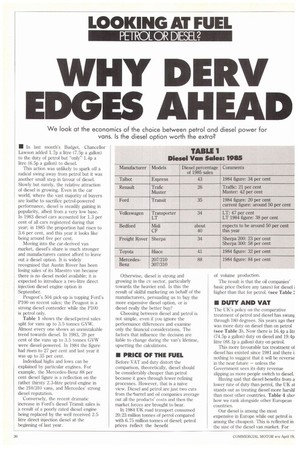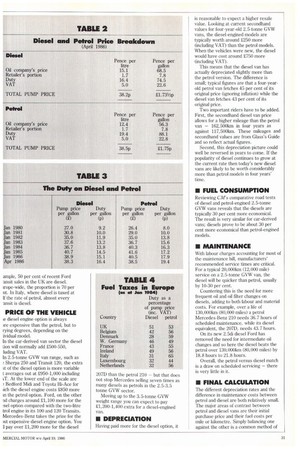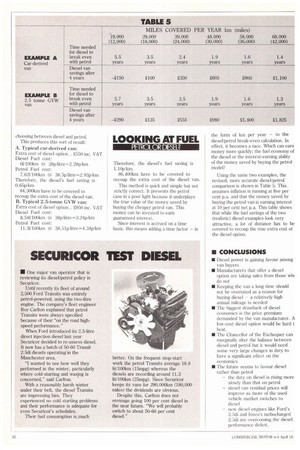W Y DERV EDGES AHEAD
Page 30

Page 31

Page 32

If you've noticed an error in this article please click here to report it so we can fix it.
We look at the economics of the choice between petrol and diesel power for vans. Is the diesel option worth the extra?
• In last month's Budget, Chancellor Lawson added 1.7p a litre (7.5p a gallon) to the duty of petrol but "only" 1.4p a litre (6.5p a gallon) to diesel.
This action was unlikely to spark off a radical swing away from petrol but it was another small step in favour of diesel. Slowly but surely, the relative attraction of diesel is growing. Even in the car world, where the vast majority of buyers are loathe to sacrifice petrol-powered performance, diesel is steadily gaining in popularity, albeit from a very low base. In 1983 diesel cars accounted for 1.3 per cent of all cars registered during that year; in 1985 the proportion had risen to 3.6 per cent, and this year it looks like being around five per cent.
Moving into the car-derived van market, diesel's share is much stronger and manufacturers cannot afford to leave out a diesel option. It is widely recognised that Austin Rover has been losing sales of its Maestro van because there is no diesel model available; it is expected to introduce a two-litre direct injection diesel engine option in September.
Peugeot's 504 pick-up is topping Ford's P100 on recent sales; the Peugeot is a strong diesel contender while the P100 is petrol only.
Table 1 shows the diesel/petrol sales split for vans up to 3.5 tonnes GVW. Almost every one shows an unmistakable trend towards diesel. In 1983, 20 per Cent of the vans up to 3.5 tonnes GVW were diesel-powered. In 1984 the figure had risen to 27 per cent and last year it was up to 35 per cent.
Individual highs and lows can be explained by particular engines. For example, the Mercedes-Benz 88 per cent diesel figure is a reflection OD the rather thirsty 2.3-litre petrol engine in the 210/310 vans, and Mercedes' strong diesel reputation.
Conversely, the recent dramatic increase in Ford's diesel Transit sales is a result of a poorly rated diesel engine being replaced by the well received 2.5 litre direct injection diesel at the beginning of last year. Otherwise, diesel is strong and growing in the cv sector, particularly towards the heavier end. Is this the result of skilful marketing on behalf of the manufacturers, persuading us to buy the more expensive diesel option, or is diesel really the better buy?
Choosing between diesel and petrol is not simple, even if you ignore the performance differences and examine only the financial considerations. The factors that influence the decision are liable to change during the van's lifetime, upsetting the calculations.
• PRICE OF THE FUEL
Before VAT and duty distort the comparison, theoretically, diesel should be considerably cheaper than petrol because it goes through fewer refining processes. However, that is a naive view. Diesel and petrol are just two cuts from the 'barrel and oil companies average out all the products' costs and then the market forces are brought to bear.
In 1984 UK road transport consumed 20.23 million tonnes of petrol compared with 6.75 million tonnes of diesel; petrol prices reflect the benefit of volume production.
The result is that the oil companies' basic price (before any taxes) for diesel i higher than that for petrol. (see Table
• DUTY AND VAT
The UK's policy on the comparative treatment of petrol and diesel has swunf through 180 degrees. Six years ago ther was more duty on diesel than on petrol (see Table 3). Now there is 16,4p a litt (74.5p a gallon) duty on diesel and 19.4p litre (88.1p a gallon) duty on petrol.
This more favourable tax treatment of diesel has existed since 1981 and there i nothing to suggest that it will be reverse in the near future — unless the Government sees its duty revenue slipping as more people switch to diesel.
Having said that diesel benefits from a lower rate of duty than petrol, the UK si stands out as treating diesel more harsh] than most other countries. Table 4 shol how we rank alongside other European countries.
Our diesel is among the most expensive in Europe while our petrol is among the cheapest. This is reflected in the size of the diesel van market. For
ample, 50 per cent of recent Ford ansit sales in the UK are diesel. irope-wide, the proportion is 70 per nt. In Italy, where diesel is taxed at If the rate of petrol, almost every .ansit is diesel.
PRICE OF THE VEHICLE
Le diesel engine option is always ire expensive than the petrol, but to rying degrees, depending on the Lividual model.
En the car-derived van sector the diesel tion will normally add £500-550, luding VAT.
En 2.5-tonne GVW van range, such as
; Sherpa 250 and Transit 120, the extra .5t of the diesel option is more variable
I averages out at £950-1,000 including T. At the lower end of the scale are Bedford Midi and Toyota Hi-Ace for Lich the diesel engine costs £850 more in the petrol option. Ford, on the other ad charges around £1,100 more for the !sel option compared with the two-litre trol engine in its 100 and 120 Transits. Mercedes-Benz takes the prize for the ist expensive diesel engine option. You pay over £1,200 more for the diesel 2071) than the petrol 210 but that does not stop Mercedes selling seven times as many diesels as petrols in the 2.5-3.5 tonne GVW sector.
Moving up to the 3.5-tonne GVW weight range you can expect to pay £1,200-1,400 extra for a diesel-engined van.
• DEPRECIATION
Having paid more for the diesel option, it is reasonable to expect a higher resale value, Looking at current secondhand values for four-year-old 2.5-tonne GVW vans, the diesel-engined models are typically worth around 250 more (including VAT) than the petrol models. When the vehicles were new, the diesel would have cost around £750 more (including VAT).
This means that the diesel van has actually depreciated slightly more than the petrol version. The difference is small; typical figures are that a four-yearold petrol van fetches 45 per cent of its original price (ignoring inflation) while the diesel van fetches 43 per cent of its original price.
Two important riders have to be added. First, the secondhand diesel van price allows for a higher mileage than the petrol van 162,500km in four years as against 117,500km. These mileages and secondhand values are from Glass's Guide and so reflect actual figures.
Second, this depreciation picture could well be reversed in years to come. If the popularity of diesel continues to grow at the current rate then today's new diesel vans are likely to be worth considerably more than petrol models in four years' time.
• FUEL CONSUMPTION
Reviewing GM's comparative road tests of diesel and petrol-engined 2.5-tonne GVW vans reveals that the diesels are typically 30 per cent more economical. The result is very similar for car-derived vans; diesels prove to be about 30 per cent more economical than petrol-engined models.
• MAINTENANCE
With labour charges accounting for most of the maintenance bill, manufacturers' recommended service times are critical For a typical 20,000km (12,000 mile) service on a 2.5-tonne GVW van, the diesel will be quicker than petrol, usually by 10-30 per cent.
Countering this is the need for more frequent oil and oil filter changes on diesels, adding to both labour and material costs. For example, over a life of 130,000km (80,000 miles) a petrol Mercedes-Benz 210 needs 36.7 hours of scheduled maintenance, while its diesel equivalent, the 207D, needs 43.7 hours.
On its new 2.5di diesel Ford has removed the need for intermediate oil changes and so here the diesel beats the petrol over 130,000km (80,000 miles) by 18.8 hours to 21.8 hours.
Overall, the petrol versus diesel match is a draw on scheduled servicing there is very little in it.
• FINAL CALCULATION
The different depreciation rates and the difference in maintenance costs between petrol and diesel are both relatively small. The major areas of contrast between petrol and diesel vans arc their initial purchase price and their fuel costs per mile or kilometre. Simply balancing one against the other is a common method of choosing between diesel and petrol. This produces this sort of result: A. Typical car-derived van: Extra cost of diesel option .. 2550 inc. VAT Diesel Fuel cost: 61/100km ((z.. 38p/litre=2.28p/kin Petrol Fuel cost: 7. 621/100km 01: 38.5p/litre =2. 93p/km Therefore, the diesel's fuel saving is 0.65p/km 84,300km have to be covered to recoup the extra cost of the diesel van.
B. Typical 2.5-tonne GVW van: Extra cost of diesel option .. 2950 inc. VAT Diesel Fuel cost: 8.541/100km 0 38p/litre=3.24p/km Petrol Fuel cost: 11.31/100km 0 38. 51p/litre =4. 34p/km Therefore, the diesel's fuel saving is 1. 10p/lun.
86,400km have to be covered to recoup the extra cost of the diesel van.
This method is quick and simple but not strictly correct. It presents the petrol case in a poor light because it underplays the true value of the money saved by buying the cheaper petrol van. This money can be invested to earn guaranteed interest.
Since interest is accrued on a time basis, this means adding a time factor in the form of km per year to the diesel/petrol break-even calculation. In effect, it becomes a race. Which can earn money more quickly; the fuel economy of the diesel or the interest-earning ability of the money saved by buying the petrol model?
Using the same two examples, the revised, more accurate diesel/petrol comparison is shown in Table 5. This assumes inflation is running at five per cent p. a. and that the money saved by buying the petrol van is earning interest at 10 per cent net p.a. This table shows that while the fuel savings of the two (realistic) diesel examples look very attractive, a lot of distance has to be covered to recoup the true extra cost of the diesel option.
• CONCLUSIONS
• Diesel power is gaining favour among van buyers • Manufacturers that offer a diesel option are taking sales from those whi do not • Keeping the van a long time should not be overrated as a reason for buying diesel a relatively high annual mileage is needed • The biggest drawback of diesel economics is the price premium demanded by the van manufacturer. A low-cost diesel option would be hard t beat.
• The Chancellor of the Exchequer can marginally alter the balance between diesel and petrol but it would need some very large changes in duty to have a significant effect on the economics • The future seems to favour diesel rather than petrol the duty on diesel is rising more slowly than that on petrol diesel van residual prices will improve as more of the used vehicle market switches to diesel
new diesel engines like Ford's 2.5di and Iveco's turbocharged 2.5di are overcoming the diesel performance deficit.






























































